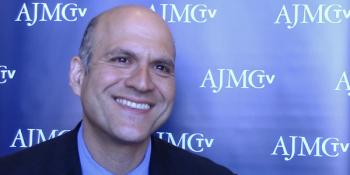
Value-Based Care
Latest News
Latest Videos

CME Content
More News

Accountable care organizations are becoming increasingly common in the United States, but they are more likely to be formed in regions of the country with populations that have a higher socioeconomic status.

The Medicare Shared Saving Program benchmark can be improved by following the example of Next Generation accountable care organizations, but with a larger adjustment level.

The authors’ survey of providers in a new accountable care organization reports that initial perceptions of this care model are ambivalent and vary among participating practices.

Highlights of our peer-reviewed research in the healthcare press.

A private accountable care organization model with an embedded care coordinator and a list of recommended providers yields cost savings similar to initiatives with risk-based contracts.

While speaking at the National Association of Accountable Care Organizations Spring 2016 Conference, Stephen Nuckolls, CEO of Coastal Carolina Quality Care, said that care coordinators have played an important role in his ACO to reach out to the patient and motivate them to become more engaged in their care. What makes a difference is showing the patient how much you care, he added.

In a series of video interviews, Donald M. Berwick, MD, MPP, president emeritus and senior fellow of the Institute for Healthcare Improvement, discussed the lessons learned from the Aligning Forces for Quality initiative.




While Joe Antos, PhD, the Wilson H. Taylor Scholar in Health Care and Retirement Policy at the American Enterprise Institute, believes that the ACO model is here to stay, he said that the way these organizations operate are likely to change.

Medicare accountable care organizations have either not yet focused on mental illness or have been, for the most part, unsuccessful in early efforts to improve their management of it.

Maximizing the utility of technology platforms and making them meaningful to ensure quality cancer care was the underlying theme of Emerging Issues and Opportunities in Health Information Technology, a National Comprehensive Cancer Network Policy Summit, held June 27, 2016, in Washington, DC.

Many accountable care organizations are beginning to adopt various programs or strategies into their framework to increase patient access to behavioral health care, but several challenges remain.

Stephen Nuckolls, CEO of Coastal Carolina Quality Care, explained during his presentation at the National Association of Accountable Care Organizations Spring 2016 Conference that the more physicians read and learn about value-based care, the more they are accepting the change. He added that as the idea has become more accepted, ACOs are beginning to evolve as well.

Critics of the Hospital Compare "Star" ratings ask whether the failure to take patient wealth into account unfairly penalizes hospitals that care for larger numbers of poor patients.

As the healthcare industry moves from volume to value, new healthcare delivery models are being tested and promoted, and CMS has put a lot of faith into the accountable care organization. So has Aledade.

Although the term "accountable care organization" (ACO) may not be here to stay, value-based organizations are here to stay based on the direction CMS is headed, said Jeb Dunkelberger, vice president of accountable care services at McKesson and clinical & commercial operations at ACO Partner.

Analyzes whether hospital participation in accountable care organizations is associated with a hospital’s quality and cost improvement outcomes in other Medicare value-based payment programs.

While speaking at the National Association of Accountable Care Organizations Spring 2016 Conference, Stephen Nuckolls, CEO of Coastal Carolina Quality Care, said that fair and transparent benchmarks are important in creating successful ACO programs.

The president predicts that in 20 years, the nation will look back on "Obamacare" as a moment of courage that has improved people's lives.

One of the biggest concerns Farzad Mostashari, MD, chief executive officer of Aledade, has about accountable care organizations, is that they are going to experience backlash similar to what managed care has received in the past.

This week, the top stories in managed care include the largest healthcare fraud takedown, one successful accountable care organization imparted its secrets, and a report identifies pharmacy trends in the public health exchanges.

In the most recent Web-based session of The American Journal of Managed Care’s ACO & Emerging Healthcare Delivery Coalition, speakers examined 3 practice transformation models.

More insurers are moving towards alternative payment and delivery models, but the transition needs to happen a lot quicker, explained Michael E. Chernew, PhD, during a panel discussion at the ACO & Emerging Healthcare Delivery Coalition Spring Live Meeting.












